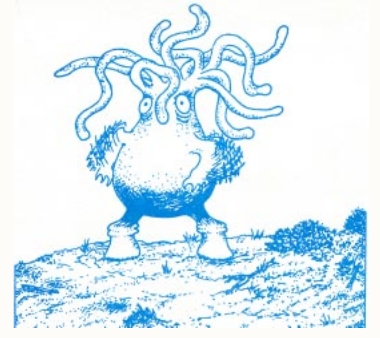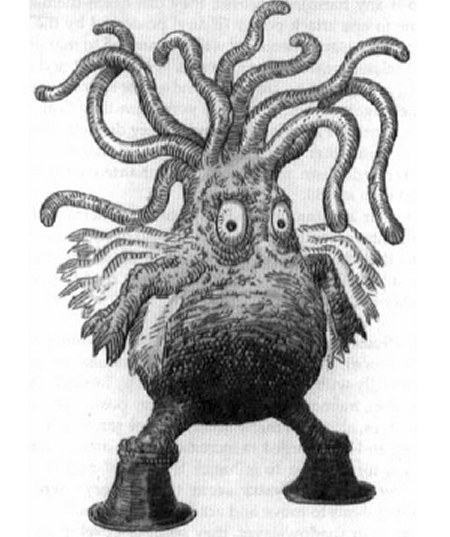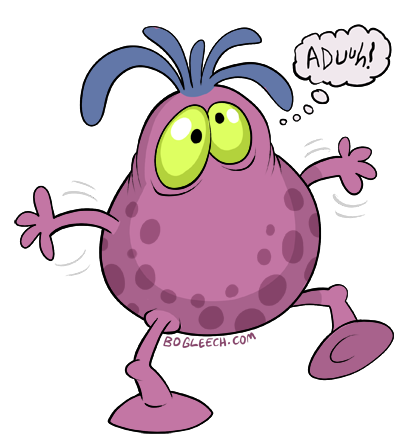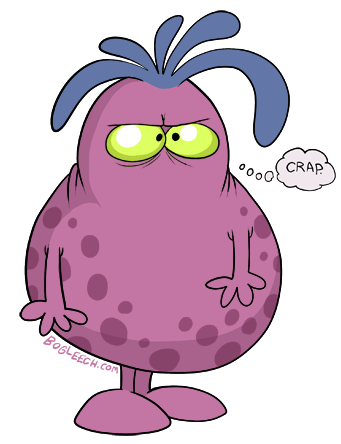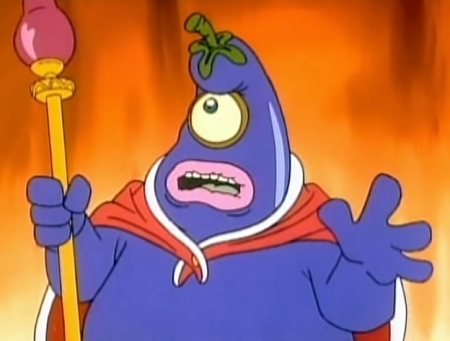|
A Dungeons and Dragons Monster Review by Jonathan Wojcik
So what if I said that Dungeons and Dragons once published a blue and purple, waddling, chittering, nearsighted egg-shaped monster with suction cup feet, giant googly eyes and sticky tentacles on the top of its head? A monster that also turns red when it's angry. A monster uncontrollably attracted to bright colors and shiny objects. A monster fatally oblivious to any surrounding danger, that will toddle straight off a cliff or into a dragon's waiting jaws if given the chance. A monster any ordinary peasant can kill with their bare hands, and happens to be filled with treasure because it can't stop putting things in its mouth...which is also on the top of its head. A monster that never, ever stops flapping its stubby, useless little arms as if it's trying to fly, which it absolutely cannot do. A monster that, above all else, it really sucks to be?
This glory of glories, this Mona Lisa of monster design, is called the Wingless Wonder, Walking Egg or most properly the Alkada. It made its debut in Dragon magazine #40, 1980, conceived by Ed Greenwood in a stroke of unparalleled genius, and I'm honestly surprised it hasn't gotten more attention in the fandom, negative or otherwise. People seem to love mining Dungeons and Dragons for comedy, and what I've shared with you thus far is barely the beginning.
Published a second time in one of the Monstrous Appendix collections, walking eggs are subtly implied to be the degenerate descendants of something that was once far more powerful - Inbred Cousins of Cthulhu, if you will - but now only capable of casting one completely random, minor magical spell per day, completely unable to control its effect. It might do something almost as impressive as generating a small fireball or turning invisible, but odds are equally high that it'll just make the grass grow faster, or maybe conjure a single confused, normal mouse. On the upside, it's completely immune to magical spells itself, and its mind is impervious to psychic contact or control, giving psionicists a brief, fleeting impression of "colorful mental chaos" before its mind "slips away." About the only dangerous thing a wonder can naturally do is unleash a temporarily confusing magical scream when finally put out of its empty-headed misery. Even their reproductive habits are as pitiful as possible. Simultaneous hermaphrodites, any two "Wonders" who blunder into one another will reflexively intertwine their tentacles and swap whatever it is Wingless Wonders swap to get knocked up. Stumbling off in whatever random new direction strikes their fancy, they may even accidentally remain together in a pair, each dimly interested in the other's company. They'll still never notice, care or even really slow down when their eggs finally plop out of their bodies, hatching into marginally smaller, stupider Wonderlings who'll just have to fend for themselves...somehow.
So, is there any real point of these things, other than being sad, helpless and hilarious? I'm so glad I pretended you asked! Alkada, you see, are actually so sad, so helpless, so hilarious that any "Wingless Wonder" you happen upon is just as likely to be someone or something magically transformed into a Wingless Wonder. Demons, evil gods and sadistic sorcerors alike may imprison their most hated enemies in the humiliating, helpless form of an Alkada, while other ne'er-do-wells may disguise themselves as the harmless things to launch an ingenious surprise attack. Their last published description even goes so far as to call them a "fad" in the art of transformative magic, offers a few flavorful anecdotes and closes with some special rules for characters who suffer such a hideolarious fate, including their odds of going completely insane for every year they spend as a toddling egg-squid. Every year. It's assumed you might actually play a game where somebody is stuck in one of these for years.
Everything about the Wingless Wonder is ridiculous, but it's a ridiculousness that fits well into a world of wizards, warlocks, sorcerers and alchemists. Fantasy is full of transformative trickery - the princess cursed with the form of a slug, the insidious demon disguised as an innocent little bunny - but here we have an entire monster deliberately conceived to be laughable for the sole purpose of livening up a Frog Prince routine. That, perhaps, is why I haven't even seen that many people making fun of it; the joke is too bluntly intentional to ridicule, and it works magnificently. If it's not already waiting for you in a new tab, I implore you to read the Wonder's complete text, if only for the story of the lone, mysterious Wonder who fried an entire family with a meteor swarm, sighed, and walked away.
I think I might know who came up with this whole thing. |
